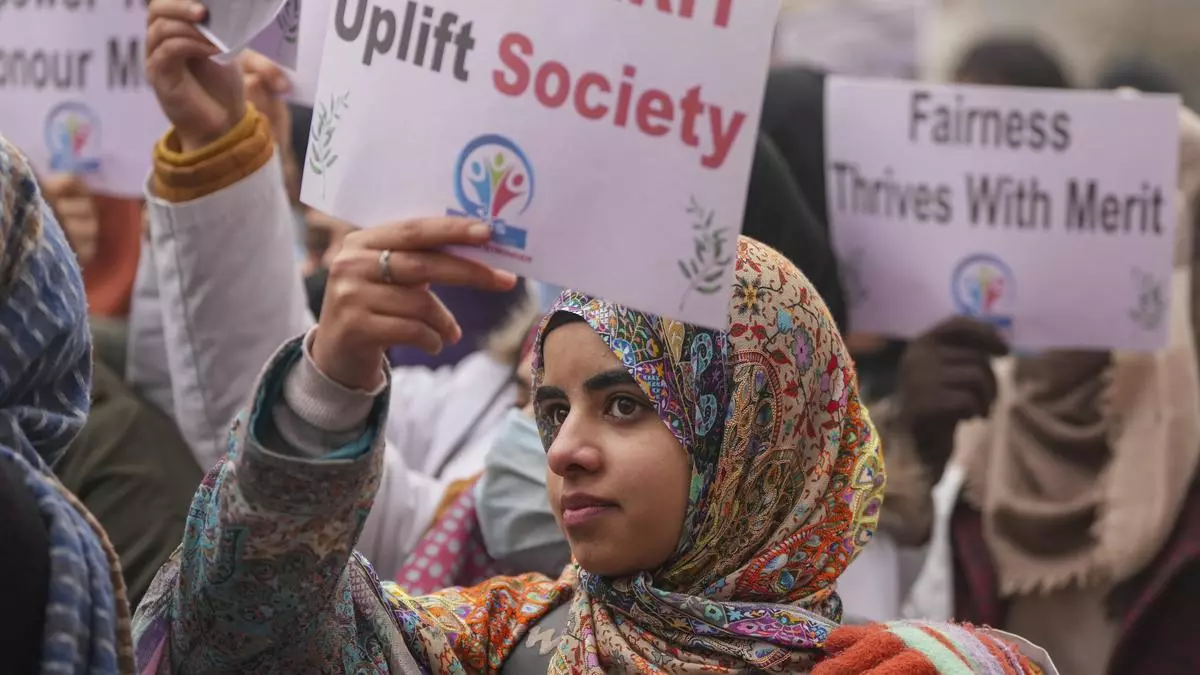
Decoding The Reservation Conundrum
The Parliament, in February 2024, approved reservations for the Pahari ethnic tribe, Padari tribe, Kolis, and Gadda Brahmins during the budget session. Later, the UT administration of Jammu and Kashmir, in March 2024, approved the proposal of the Social Welfare Department to amend the Jammu and Kashmir Reservation Rules, 2005, in light of:
Read Also J&K Cabinet Sub-Committee Reviews Reservation Policy '70% of Population, 30% of Opportunities': J&K Students Intensify Reservation ProtestFour new tribes-the Pahari ethnic group, Padari tribe, Kolis, and Gadda Brahmins-were included in the Scheduled Tribes, and a separate 10% reservation was allocated for these newly included tribes, taking the total reservations under the Scheduled Tribe (ST) umbrella to 20%. Besides, 15 new castes in OBCs were incorporated, with an increased proportion in reservation up to 8%, as recommended by the Socially and Educationally Backward Classes (SEBC).
Earlier, Jammu and Kashmir had 8% reservation for SCs, 10% for STs, 4% for OBCs, 4% for residents along the Line of Actual Control/international border, 10% for Residents of Backward Areas (RBA), and 10% for Economically Weaker Sections (EWSs). These amendments in the reservation policy did not go well among youth and civil society alike. Calls for a review and reversal of the policy, especially among youth, are being sounded across the valley.
Before the addition of Paharis to the list of Scheduled Tribes, the Gujjar-Bakerwal tribal community cornered the biggest share of the 10% reservation in government jobs and educational institutions for tribes. The prospect of sharing this with the Paharis, who are the most educated and affluent group, had led to much resentment among the Gujjar-Bakerwals. The Union Territory administration, however, found a way out. It added 10% to the existing quota for the Scheduled Tribes, to be shared by the Paharis and three newly added groups-leaving the Gujjar-Bakerwal's share of 10% untouched.
In this win-win situation, however, many others, especially the unreserved aspirants, firmly believe they are losing out. The recent broadening of the reservation umbrella has now taken the percentage of reserved categories in jobs and professional educational institutions in the Union Territory from 50% to 60%. The pool open for the general category has been reduced to 40%, which has statistically shrunk to 30%, as the 40% seats for the unreserved category include 10% horizontal reservation (6% for ex-servicemen and 4% for physically handicapped persons, which are to be absorbed from the unreserved quota).
Realistic Issues Emerging out of Reservation Policy
The increased proportion in reserved categories is violating the provisions of the Jammu and Kashmir Reservation Act, 2004, which categorically underlines that the percentage of reservation shall in no case exceed 50%. This provision has drawn its essence from a 1992 nine-bench judgment of the Honorable Supreme Court, which, in its verdict, accepted a 50% cap on caste-based reservations. But over the years, this ceiling has been continuously eroded by various states and UTs across the country.
Providing reservation to socio-economically disadvantaged strata of society is integral to addressing the uneven developmental pattern of the country so that the marginalized sections of society are in a position to break the vicious cycle of poverty, educate their children, and stand shoulder-to-shoulder with other citizens to cherish the actualization of the nation as a developed nation with a deep essence of admiration towards inclusivity. A nation where everyone feels included and meaningfully contributes to the nation-building process.
With this aim, our forefathers of the constitution incorporated the provisions of reservation into our constitution for the upliftment and betterment of the marginalized sections of society. We need to take a pause and ponder: have the seeds of reservation truly reached the people who were really deserving? Who actually benefited? If the marginalized sections of society have harvested the fruits of reservation, are there visible indicators showing that they truly have prospered? Are they at par with the people from the upper strata of society in terms of living standards, dignity, employment, and education?
When the provisions of reservation were incorporated into the constitution, they were purely added as a temporary measure until developmental uniformity was realized and those living in abject poverty attained a degree of economic prosperity. It has been 77 years since independence, and the temporary provision of reservation has attained a degree of permanency and has become an inevitable tool in the political landscape, shaping regional and national political dimensions.
Way Forward
The implementation of a just reservation model must revolve around the following core principles:
Views expressed in the article are the author's own and do not necessarily represent the editorial stance of Kashmir Observer
- The author is an educationist and columnist
Follow this link to join our WhatsApp group : Join Now
| Be Part of Quality Journalism |
| Quality journalism takes a lot of time, money and hard work to produce and despite all the hardships we still do it. Our reporters and editors are working overtime in Kashmir and beyond to cover what you care about, break big stories, and expose injustices that can change lives. Today more people are reading Kashmir Observer than ever, but only a handful are paying while advertising revenues are falling fast. |
| ACT NOW |
| MONTHLY | Rs 100 | |
| YEARLY | Rs 1000 | |
| LIFETIME | Rs 10000 | |
CLICK FOR DETAILS

Legal Disclaimer:
MENAFN provides the information “as is” without warranty of any kind. We do not accept any responsibility or liability for the accuracy, content, images, videos, licenses, completeness, legality, or reliability of the information contained in this article. If you have any complaints or copyright issues related to this article, kindly contact the provider above.








Comments
No comment